by Alex Addyman
Immigration is a hot topic – so hot indeed that according to recent research it could decide who runs the country in two years’ time. But, as recent research from The Economist highlights, the extent of immigration concern amongst voters and the evidence from previous immigrant waves is at odds.
The Economist suggests that fears prior to the influx of Polish immigrants from 2004 onwards have largely proved unfounded. While the Polish population in the UK has grown to become the second largest foreign-born population in a relatively short time they have integrated well both socially and economically.
Evidence to support this includes examples from the East and West Midlands where property crime has dropped and social cohesion has improved. Also contrary to suggestions that immigrants will impose a strain on public services and welfare, evidence shows that relatively few Poles (or other Eastern Europeans) use health or public housing services or claim benefits.
Economically there are examples of Poles taking jobs which were not being filled prior to 2004 including from a Conservative Councillor and business owner in Peterborough. Furthermore whilst many Poles began by filling more menial jobs they have begun to become more entrepreneurial and more ambitious potentially leaving a gap for newly arriving Bulgarians and Romanians to fill.
This positive picture of Polish integration is not lost on the public either, it would seem. Polls show that when asked most people claim to like local Polish and other East European communities. Despite this most people polled remain opposed to further immigration – particularly prior to the influx of Bulgarian and Romanians in January 2014.
The evidence covered in this post would suggest that fear of change is perhaps one of the biggest factors at play in discussions around immigration to the UK. People fear a massive influx of new people, whatever their background. The evidence here demonstrates that, once new arrivals have settled, the existing populace grows less fearful and even grows to appreciate the presence of immigrants both socially and economically.
“Articles referred to in this blog (please note you must be a member to view them):”
- The Polish paradox (east European immigration to the UK)
- The immigration reform: a policy briefing
- They are not coming (Bulgarian and Romanian migrants)
- Perceptions and reality: public attitudes to immigration
Share
Related Posts
A recent item on BBC Radio 4’s Today programme generated an unusually high number of responses from listeners. A man who had lost his job in the financial services sector at the age of 57 described his difficulty in trying ....
A recent survey by the Royal Town Planning Institute (RTPI) in July 2021 aimed to gauge UK public awareness of the planning profession. The results suggested a significant disconnect between the public perception of planning, the scope of professions in ....
It is well recognised that the UK faces a shortage in STEM (science, technology, engineering and maths) skills, and that at current projections, this gap in skills and knowledge is only going to grow in the coming years. Before the ....
Yesterday marked the 111th International Women’s Day, a global day of celebration for the social, economic, cultural and political achievements of women. But it is also an opportunity to reflect on and further the push towards gender equality. While there ....

